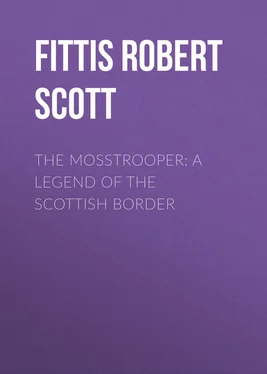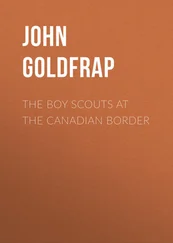Robert Fittis - The Mosstrooper - A Legend of the Scottish Border
Здесь есть возможность читать онлайн «Robert Fittis - The Mosstrooper - A Legend of the Scottish Border» — ознакомительный отрывок электронной книги совершенно бесплатно, а после прочтения отрывка купить полную версию. В некоторых случаях можно слушать аудио, скачать через торрент в формате fb2 и присутствует краткое содержание. Жанр: foreign_antique, foreign_prose, на английском языке. Описание произведения, (предисловие) а так же отзывы посетителей доступны на портале библиотеки ЛибКат.
- Название:The Mosstrooper: A Legend of the Scottish Border
- Автор:
- Жанр:
- Год:неизвестен
- ISBN:нет данных
- Рейтинг книги:5 / 5. Голосов: 1
-
Избранное:Добавить в избранное
- Отзывы:
-
Ваша оценка:
- 100
- 1
- 2
- 3
- 4
- 5
The Mosstrooper: A Legend of the Scottish Border: краткое содержание, описание и аннотация
Предлагаем к чтению аннотацию, описание, краткое содержание или предисловие (зависит от того, что написал сам автор книги «The Mosstrooper: A Legend of the Scottish Border»). Если вы не нашли необходимую информацию о книге — напишите в комментариях, мы постараемся отыскать её.
The Mosstrooper: A Legend of the Scottish Border — читать онлайн ознакомительный отрывок
Ниже представлен текст книги, разбитый по страницам. Система сохранения места последней прочитанной страницы, позволяет с удобством читать онлайн бесплатно книгу «The Mosstrooper: A Legend of the Scottish Border», без необходимости каждый раз заново искать на чём Вы остановились. Поставьте закладку, и сможете в любой момент перейти на страницу, на которой закончили чтение.
Интервал:
Закладка:
The red sun went down, leaving a trail of fire at the “gates of the west”; and a dreary quietude brooded on the hills – scant sign or sound of life being apparent save what the homeward-bound rooks made as they sailed, weary of wing, this way and that. But as the gloaming fell, a solitary pedestrian emerged from one of the passes on the Scottish side of the marches – a tall and stoutly-built but youthful man. A short cloak of untanned deerskin hung from his shoulders, being secured at the throat by a knot of thongs, and it partly hid a doublet, called, in Border phrase, a jack , of boiled leather, fitting close to the body, and strengthened on the breast (if not also all over the shoulders and sleeves) by small circular plates of hammered iron sewed on in overlapping fashion like the scales of a fish. A broad buff belt around his waist, held by a polished brass buckle, sustained an iron-hiked sword and a long knife or dagger, termed a whinger , hafted with buck-horn, curiously carved. His right hand – the other being studiously concealed under his mantle, and apparently carrying something rather bulky – was encased in a leathern gauntlet, the back of which was defended by little plates of mail like those on the jack. On his head he wore an iron bascinet cap, rusty and much dinted, and from under its rim straggled locks of dark brown hair inclining to curl. He had a thin, sallow, unprepossessing physiognomy, which expressed a combination of cunning and effrontery: two keen, grey eyes sparkled under heavy brows; and a slender moustache, lighter in colour than his locks, sparsely covered his upper lip; but the livid scar of a cicatrized wound, evidently from a sword-cut, adown his left cheek, gave, on close observation, a peculiar grimness to his otherwise sinister mien. Altogether, he might be considered as a typical Borderer of the time, rough-living, law-defying, rarely ever out of “sturt and strife.”
On quitting the defile, he struck across a stretch of open moorland, over which the rising night-wind fitfully sighed among the furze. Now and then he paused and gazed eagerly behind, seeming to listen, as if dreading pursuit; but pursuers there seemed none, save the cloud-billows that rolled in endless succession over the dim hills and darkened above his head. The waste soon became both rugged and marshy, and a shallow rivulet, fed from the moss-hags, ran in a serpentine and perplexing course, necessitating its being repeatedly waded, but the water never came much above the traveller’s ankles, and he wore a pair of strong buskins reaching to the calf of his leg. When he had finally left the sinuosities of the sluggish stream in his rear, he made a dead halt, as if come to the end of his journey, and scowled all around him in the gloom. Throwing back the left side of his cloak, he disclosed a young child, well wrapped up, and fast asleep, whom he was carrying, and whom he immediately laid down on the heath at his feet. The infant awoke, and began to whimper and wail. The man stood bending his moody gaze upon it till his eyeballs glowed with dusky fire.
“This nicht,” he said, in a low tone, savouring of fierce exultation, “this nicht will the proud Southron grieve, and the bonnie lady greet in her bower, for the loss o’ the young heir that was the hope o’ their hearts. The retainers may scour hill and dale, and the pathless wilds echo the bay o’ their sleuth-hound. Let them speed far and wide wi’ horse and ban-dog. In my hand rests the young heir’s fate. By the Black Rood o’ Melrose! this is the revenge o’ gentle Edie Johnston!”
He stamped on the ground, and could have crushed the infant under his heel; but he started back a pace, as if, indeed, the fiend of revenge had prompted such a thought in his troubled brain, and he revolted at it – but he revolted only for a moment, as the savage suggestion seemed to be followed by another equally remorseless. What did he now meditate? Was he one
Whom the vile blows and buffets of the world
Had so incens’d, that he was reckless what
He did, to spite the world?
Nervously his fingers clutched the hilt of his whinger, and he unsheathed it and waved it in the air, and then, stepping forward and stooping over the child, pointed the steel as if to deal a mortal stab. The weapon trembled in his grasp. Again the powers of compunction and shame overcame the murderous impulse. He raised himself erect, with an impatient ejaculation, and his armed hand fell slowly, and as if reluctantly, by his side.
“Frae sunset to sunset has this hand been feckless as a withered rush,” he said. “In darkness as in licht I ha’e been weak as water. I micht ha’e flung the brat, like a stane, frae the brow o’ a fathomless precipice, never mair to be seen but by the ravens: or he micht ha’e been thrown into a rushing stream that would ha’e swirled him awa’ to the sea; and nae mortal could ha’e fyled me wi’ the deed; and yet he is spared, as if his life were charmed by a spell o’ power. Maun I, a gentle Johnstone, forget my wrangs? My faither fell in an inroad o’ the Southrons: my mither was twice harried out o’ her cot-house in the cleugh: and I – ” He paused, and stroking his scarred cheek, glanced alternately around him and at the sobbing boy on the cold turf: then sheathed his whinger, lifted the babe, and strode hurriedly on his way.
Soon he came to a spring-well, a round, brimful well-e’e , fringed with furze. There he stopped, mused some space, and muttering a curse, suspended the child over the water, as if intending to let it drop and drown. But as he gazed fixedly on the limpid element, which shimmered under the dim sky, a lustrous planet shone out through the clouds and glittered in the natural mirror, the golden similitude sparkling up like the eye of an accusing spirit. It was what guilt could not withstand. The mystic gleam of the shadowy star smote the gentle Johnston to the soul. Drawing a harsh breath, he succumbed once more to a power that shamed his fierce nature. Huddling the infant under his rude mantle, he hurried from a spot where temptation had pressed him so strongly.
Straight northwards he held his route, with the shades of night deepening on what seemed a desert, where no living things seemed near save the heath-birds that started at his approach, and sped away with shrill screams. Some heavy drops of rain, “like the first of a thunder-shower,” pattered on his head-piece and deerskin garment, and louder grew the sough of the gale, which prognostications of an inclement night caused him to quicken his pace. The child had now wept itself to sleep, and its bearer showed every care to screen it from the rough weather. Happily, the threatened storm blew by. But although the night settled down, the Borderer still travelled comparatively fast, with long, unwearied stride, as being well inured to exertion and well acquainted with the country which he was traversing. Indeed, we may not err in supposing that in the latter respect he could rival “stout Deloraine,” of whom the Last Minstrel tells us that —
Through Solway sands, through Tarras moss,
Blindfold he knew the paths to cross;
In Eske, or Liddel, fords were none,
But he would ride them, one by one;
Alike to him was time or tide,
December’s snow, or July’s pride;
Alike to him was tide or time,
Moonless midnight, or matin prime.
Sometimes the traveller changed his course to a certain extent, inclining now to the right, now to the left, probably to avoid the neighbourhood of hamlets: his darkling journey was one of hours; but eventually the blustering blast swept away the clouds, and a frosty starlight shone down, enabling him to perceive that he was nearing the spurs of a range of low hills. On he went towards a wide ravine, and entering it, was soon plodding sturdily along a well-beaten but winding path, whilst the gale whistled shrilly through the underwood that clad both sides of the glen. As he progressed, his eye caught the feeble glimmer of a light in the distance, which he knew was not the twinkle of a star, and which was inconstantly seen and lost according to the turnings of the road.
Читать дальшеИнтервал:
Закладка:
Похожие книги на «The Mosstrooper: A Legend of the Scottish Border»
Представляем Вашему вниманию похожие книги на «The Mosstrooper: A Legend of the Scottish Border» списком для выбора. Мы отобрали схожую по названию и смыслу литературу в надежде предоставить читателям больше вариантов отыскать новые, интересные, ещё непрочитанные произведения.
Обсуждение, отзывы о книге «The Mosstrooper: A Legend of the Scottish Border» и просто собственные мнения читателей. Оставьте ваши комментарии, напишите, что Вы думаете о произведении, его смысле или главных героях. Укажите что конкретно понравилось, а что нет, и почему Вы так считаете.












